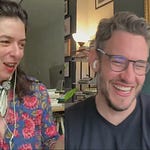Yesterday, I sat down with Matt Ruby, a comedian who's somehow managed to turn drug experimentation into art, philosophical wisdom into punchlines, and crowdwork critique into a manifesto. What started as a chat about joke writing quickly devolved into an exploration of why we're all slaves to Chinese algorithms, how meditation is the antidote to everything, and why tension might just be comedy's secret weapon.
Matt's an inventive comic. He once did a special called Substance where he performs the same material drunk, high, on mushrooms, and sober – not because he's reckless, but because he's genuinely curious about consciousness. His Substack, Funny How: Letters to a Young Comedian reads as if Marcus Aurelius decided to become a stand-up comic, and his latest special Bolo proves he's not just thinking about comedy deeply – he's executing it at the highest level in the trenches of NYC comedy clubs.
The Worst Sin You Can Commit
"I think the worst sin that you can do is to be dull," Matt told me early in our conversation. "Just don't be boring." It's a philosophy that extends beyond the stage into his entire approach to art and life. When everyone else is zigging, he’s looking for what he can break to make his comedy zag. Or zog. Or something.
This isn't contrarianism for its own sake – it's strategic differentiation based on supply and demand. "If there's something that everyone else is saying, it's probably not going to be great fodder for stand-up." The result of doing the opposite is comedy that feels like watching someone dig a hole for themselves just to see if they can climb out. As Matt puts it, "Sometimes digging a hole for yourself... if you can get out of it, it's almost like a magic trick element to it."
The Philosophy of Getting Uncomfortable
Matt's approach to tension might be the most illuminating thing about his comedy philosophy. When I mentioned how audiences sometimes seize up at the topic of a joke rather than waiting for the target, he lit up: "To me, that's a golden opportunity. Tension is opportunity."
His analogy is perfect: "Tension to a comedian is what waves are to a surfer." You don't paddle away from waves – you learn to ride them. "Laughter is tension released, so if you've got them feeling tense, that's not necessarily something to run away from."
This isn't just theory. Matt's 2020 special tackled cancel culture not by taking cheap shots, but by genuinely exploring the discomfort around what we can and can't say. The audience doesn't know where he's going, which creates that crucial tension that great comedy requires.
The Substance Experiment: Malcolm Gladwell Meets Morgan Spurlock
Matt's most audacious project remains Substance, where he performed stand-up under the influence of alcohol, weed, mushrooms, and completely sober. As his friend Gina noted, "It makes sense because you have your 10,000 hours in all of those things."
The results were revelatory. Alcohol, he discovered, is "the worst possible drug there is" for performing. "I felt like I had broken a contract with the audience... as soon as the audience hears you slur, all bets are off."
The drunk set was all ego: "I'm doing great, they love this." The mushroom set was complete ego loss: "This is about us, what can we do together?" One drug builds walls, the other tears them down – a perfect window into what these substances actually do to human consciousness.
The Chris Rock Rule and the Death of The Hang
One of the most practical pieces of advice Matt shared came from Chris Rock: "If there's anything that you've talked about three times in your life with someone else, try talking about it on stage." The logic is bulletproof – if you've brought it up three times, you clearly care about it, and that authentic investment is what audiences crave.
But here's the problem: The Hang is disappearing. Matt came up in the era of Rififi, "this video store that had a bar," where comedians would stick around after shows and actually talk to each other. "After the show, everyone would just hang out and there'd be like this great hang of comedians who were on the show, newer comedians, people who just wanted to be in the scene."
Now? "Everyone's just sort of in their silos. Even when you go to a comedy show, people do their spot and then they leave afterwards." The green room that used to be full of ball-busting and zinging is now just "comics huddled over their phones."
This matters because Matt's best material comes from real conversations: "A lot of my favourite jokes or ideas for jokes don't come from sitting down at a laptop... It comes from having conversations with cool, interesting, smart, funny people." When a joke originates from genuine conversation, "the audience can perceive on stage... that's who you really are."
Meditation, Mushrooms, & the Pursuit of Presence
Matt's been meditating since childhood – his mom had a meditation room. His joke: "The first time I ever smoked weed, I was like, wow, this smells a lot like my mom's meditation room."
But his approach to mindfulness goes deeper than nostalgia. He sees meditation as "the antidote to being online and on screens all the time." We've eliminated daydreaming because we have "this IV drip of content available to us at all times," and meditation might be the only way to access that generative, wandering state our brains need.
The connection to comedy is profound. Both meditation and the Chris Rock rule operate on the same principle: "What keeps arising?" In meditation, you notice what thoughts keep coming up. In comedy, you notice what topics you keep returning to. Both are revealing something essential about who you really are.
The Crowdwork Apocalypse
Matt has thoughts about the algorithmic dominance of crowd work clips, and they're not pleasant. "It's weird to me that it did pivot into being like a dominant version of the art craft... as perceived online by people who just see it on social media."
The problem isn't crowdwork itself – it's that the algorithm loves it because it provides instant context and the voyeuristic thrill of strangers interacting. "So many people online are just alone and on a screen all day. And it is like, Oh my God, look, look at these two people who don't know each other interacting."
But here's our real shared grievance: "We're all just being slaves to the algorithms and I feel not great about having my entire art form pivot because it's what helps out Mark Zuckerberg and the Chinese government. I don't want those people determining what makes good art."
His solution? "Burn it away. Burn it" regarding material protection. "Most of the world's never even going to see it in the first place. So spread it out there. Put it out again."
The Loud-Soft-Loud Dynamic
Matt's musical background in Chicago rock informed more than just his rhythm – it gave him a framework for understanding comedy dynamics. "I love Led Zeppelin or the Pixies or that sort of loud, soft, loud dynamic and how one buys you the other."
In comedy, this translates to using silly material to buy bandwidth for deeper content. "Being silly and dumb can buy you being deep and melancholy." You can see this in Louis C.K.'s work, where "you might have something like the deepest philosophical bits and then you're gonna have like a fart joke."
The principle extends beyond individual sets to entire careers and even political discourse. "Maybe there's not one right answer. Maybe there are two poles... swinging like a pendulum instead of just trying to bully your way through like a battering ram."
Surfers, Gardeners, and Universal Wisdom
Matt's got theories about who understands the universe best, and they're surprisingly specific: surfers and gardeners. "I think surfers and gardeners sort of understand the universe in some really deep ways that the rest of us can learn from."
Gardeners understand "seasons and having a fallow period and blossoming and planting seeds and nurturing things." Surfers understand "the rhythm of the universe and waves... using the energy of the universe and enjoying when you're on the wave and also realising the wave's going to end."
Both activities force presence and acceptance of natural cycles; exactly what our screen-addicted culture has forgotten.
The Shamanic Art of Energy Management
Watching Chappelle work a small room gave Matt a revelation about comedy's deeper purpose: "I remember watching him do a set at Comedy Cellar... really feeling like, oh, this is very shamanic in how he's using the energy and playing with it."
Chappelle would push the audience away with challenging material, "making them recoil, making them be like, I don't know about this at all. And then masterfully pulling them back in via laughter." It's a push-pull technique that takes decades to master.
This connects to something profound about grief and laughter that Matt's explored: "During the process of death and grieving, how much is hilarious... because we just can't exist in that realm of tension all the time, 24 seven for weeks on end." The biggest laughs often come at funerals because "your body's craving it."
The Antidote to Everything
For Matt, live comedy represents something essential we're losing: "I get to be in a room with a room full of people who are not on their screens, who are aligned with a bunch of strangers and who are experiencing joy. And it's like, Oh, thank God... this is how we're supposed to be."
The communal experience of comedy – like going to church, AA meetings, or book clubs – offers "synchronised nervous systems" and connection to something larger than ourselves. "There's something innately that we know inside that makes us feel like the world is okay and that we're connected."
Meanwhile, screens are "pressing this button in our head where they can frack our brain stems and make us angry because it's a great way to monetise us."
Robot or Animal: Choose Your Future
Matt's vision of the future is stark but oddly hopeful: "I think there's probably some path where you choose between robot or animal in the future." You can have your Neuralink and AI girlfriend and live in virtual reality, "or you'll be an animal who has to deal with human emotions and not knowing stuff and getting lost."
His choice? "I'll choose to get lost."
The Holy Grail of Stand-Up
Throughout our conversation, Matt kept returning to what he calls "the holy grail of a good stand-up comedy joke" – material that comes from who you really are, discovered through genuine conversation and real caring. "That's who you are. You're offstage just having some drinks with a friend of yours, and it's what's coming out of you."
When material originates from this authentic place, "there's some harmony that goes on when a joke arises that way that the audience can perceive." It's not about pandering or trend-chasing – it's about finding what you actually care about and trusting that your genuine investment will translate.
(My text with a comedian today about how I accidentally ordered too many bananas resulted in them telling me ‘that’s a bit’ and then me spending this afternoon building it out into a bit I will try tonight. You should come. West Side Comedy Club, 8pm.)
The Rebellion of Presence
Despite his concerns about our algorithmic future, he maintains faith in human rebellion: "I think if people are miserable, eventually that bubbles up in a way that they're like, I don't want to do this anymore."
His work – both on stage and on Substack – feels like part of that rebellion. By examining comedy with philosophical rigour, by treating consciousness as worthy of artistic exploration, by insisting that attention and presence are the real currencies of art, he's making a case for choosing the human over the algorithmic.
In a world increasingly designed to fragment our attention and monetise our outrage, Matt Ruby is doing something quietly radical: He's asking us to sit with ourselves, notice what keeps arising, and trust that our authentic obsessions might just be the thing the world needs to hear.
And if that's not wisdom worth paying attention to, I don't know what is.
Things we talked about:
Matt Ruby's Comedy Substack: Funny How - Deep dives into comedy philosophy and craft
Matt Ruby's Personal Substack: The Rubes Letter - Essays on tech, mindfulness, and culture
Working Methods - Matt's newsletter on creative process
Matt Ruby Comedy - All his stand-up specials and tour dates
Bolo on YouTube - His latest and best special
Substance on YouTube - The experimental four-part series
Mike Birbiglia's Working It Out podcast - The Ira Glass episode Matt referenced
Waking Up App - Sam Harris's meditation app (mentioned in our chat about meditation)
How to Change Your Mind by Michael Pollan - The psychedelics book that influenced Matt's thinking














